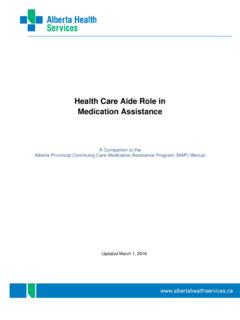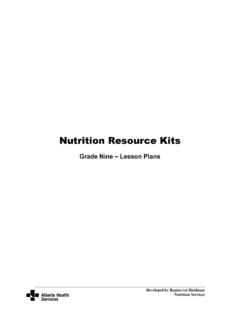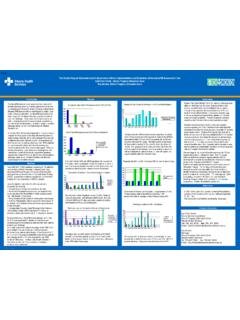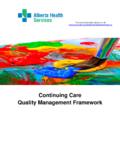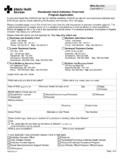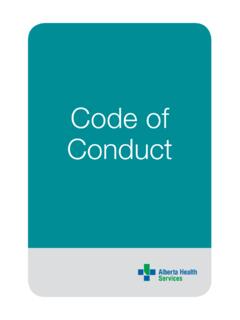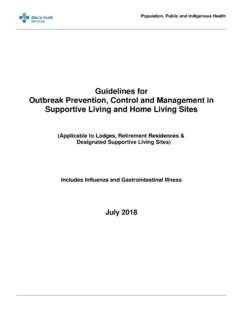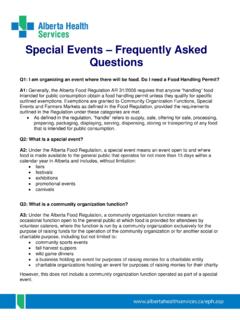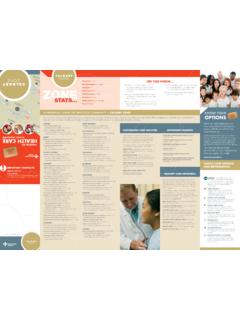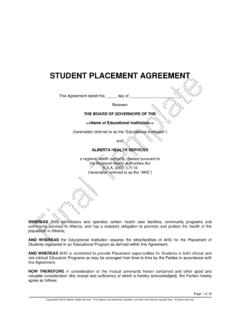Transcription of Current Guidance for the Management of Adult Hospitalized …
1 1. Last updated: December 22, 2021 all information subject to change. See AHS Insite COVID-19 resources for Current version. Current Guidance for the Management of Adult Hospitalized Patients with COVID-19. Prepared By: The COVID-19 Therapeutics Working Group, Alberta Health Services Note: This document represents updated Guidance (previous update December 14, 2021) and will be updated as relevant new information becomes available. As such, the most Current web-based version of this document should preferentially be used. The COVID-19 Therapeutics Working Group has updated the evolving evidence base for this document as best as possible but recognizes that future updates will be required based on ongoing therapeutic trials and emerging evidence. Supportive care remains an important component of therapy for individuals infected with SARS-CoV-2.
2 Updated COVID-19 Management guidelines from the Public Health Agency of Canada (PHAC), Association of Medical Microbiology and Infectious Diseases (AMMI), Canada/Canadian Critical Care Society (August 21, 2020)1, the Infectious Diseases Society of America (IDSA) (September 3, 2021)2 and the Alberta Health Services COVID-19 Scientific Advisory Group3 have been reviewed in preparing this update. Full details are available in the hyperlinks above and the referenced documents below. Consultation with other specialties ( Infectious Diseases, Respiratory Medicine, Critical Care, General Internal Medicine) who are most likely to be familiar with the rapidly evolving literature can be considered to help assess the risks and benefits for an individual patient.
3 As recommended by AHS Ethics, any off-label use of medication requires the prescriber's careful consideration of risk/benefit, consultation between experts and attending physician as needed, and documenting consent from the patient or caregiver after discussion of the Current state of evidence of benefit and harms. Adverse events with respect to off-label use of medications for inpatient treatment should be documented and reported by clinicians through the AHS. Reporting and Learning System for Patient Safety. The Guidance provided in this document does not replace best clinical judgment and/or expert consultation but rather is meant to inform clinicians of the most Current Management guidelines to facilitate best use of therapeutic options for patients with COVID-19.
4 Current Guidance for the Management of Adult Hospitalized Patients with COVID-19. Document Owner: COVID-19 Therapeutic Working Group ECC Approved: 12/22/2021 1506hrs 2. Guiding Principles 1) The use of antiviral or other immunomodulatory treatments, other than those recommended below, for patients with COVID-19 should occur within the context of controlled clinical trials wherever possible, given the currently available limited therapeutic options for which evidence-based data are available. 2) If the use of antiviral or immunomodulatory agents for COVID-19 outside of clinical trials is being considered, the potential risks (adverse reactions, drug interactions (see COVID drug interactions or Lexicomp) versus unverified benefits must be considered and discussed with the patient or caregiver, and consent documented on the chart.
5 3) Bacterial co-infection in patients with early COVID-19 is uncommon. Do NOT routinely add antibacterials unless bacterial infection is strongly suspected. If indicated, antibacterials should be reassessed within the first 3 days after initiation to determine if continuation is necessary, or to de- escalate and/or optimize therapy in accordance with the principles of stewardship to avoid short-term adverse-effects and negative long-term consequences of increased microbial resistance. Current Practice Guidance 1. General Considerations Patients with mild suspected or confirmed COVID-19 should not require hospitalization, unless there is a clinical concern for rapid deterioration, significant underlying co-morbidities, extenuating sociodemographic circumstances, or an inability to return promptly to hospital.
6 Patients with mild COVID-19 and their caregivers should be provided with information on symptom Management and informed of the signs and symptoms of complications that should prompt medical re-evaluation. Patients with moderate suspected or confirmed COVID-19 ( with clinical signs of pneumonia, SpO2 . 90% on room air, but no signs of severe pneumonia) who are not determined to be at high risk of deterioration may not require hospitalization, but they should self-monitor and be counseled along with their caregivers about the signs and symptoms of complications that should prompt medical re- evaluation. Patients with severe suspected or confirmed COVID-19 and respiratory distress, hypoxemia, or shock should receive supplemental oxygen therapy immediately with target saturations of > 94% SpO2 during resuscitation.
7 Patients with severe illness should be closely monitored for signs of clinical deterioration, specifically rapidly progressive respiratory failure, or shock. In Hospitalized Adult patients who meet criteria for severe disease (defined by the IDSA as SpO2 <94%. on room air), and requiring supplemental oxygen, mechanical ventilation or extracorporeal membrane oxygenation, clinicians should prescribe dexamethasone 6 mg IV/PO daily for 10 days (or equivalent glucocorticoid dose)4, or until off oxygen or discharged, whichever is earlier. Glucocorticoids are not recommended in patients who do not have hypoxemia requiring supplemental oxygen. Current Guidance for the Management of Adult Hospitalized Patients with COVID-19. Document Owner: COVID-19 Therapeutic Working Group ECC Approved: XXXXX.
8 3. 2. Antibacterials For those patients with suspected or confirmed mild to moderate COVID-19, antibiotics should not be routinely prescribed unless there is clinical suspicion of a bacterial infection. For patients with severe COVID-19 but not critically ill, do NOT routinely add antibacterials unless bacterial infection is strongly suspected. For critically ill patients with suspected or confirmed severe COVID-19, empiric antibacterial agents to treat all likely pathogens causing severe acute respiratory bacterial infection and sepsis as soon as possible are reasonable, and optimally should be initiated within 1 hour of initial patient assessment for patients with sepsis. If indicated, empiric antibiotic treatment should be based on the working clinical diagnosis ( , community-acquired pneumonia, health care-associated pneumonia or sepsis), local epidemiology, and susceptibility data.
9 See references such as Bugs & Drugs for empiric antibacterials. Use of antibacterial therapy should be judicious with reassessment after 3 days for de-escalation and/or optimization of therapy, in accordance with the principles of stewardship, after review of the clinical status, laboratory and imaging findings, and microbiology results. 3. Antivirals/Immunomodulators Remdesivir is approved for use in Adult Hospitalized patients with COVID-19 pneumonia if they are not mechanically ventilated5. Patients can be given remdesivir if they are acutely ill from COVID-19, or if they are immunocompromised according to the definition in the AHS Infection Prevention and Control Management of Severely Immunocompromised COVID-19 Patients document. Tocilizumab is approved for use in patients with severe COVID-19 pneumonia6.
10 To be eligible, patients must have been admitted to hospital for COVID-19 pneumonia 7 or fewer days ago, or have developed symptoms from hospital-acquired COVID-19 pneumonia 7 or fewer days ago. They must also be experiencing significant progressive respiratory failure due to COVID-19 pneumonia that requires they receive ventilation (invasive or non-invasive) or supplemental oxygen to achieve a minimum SpO2 of 90%. Supplemental oxygen is defined as heated high flow oxygen with FiO2 > , nasal prong delivered oxygen at a rate of 6 L/minute, or mask delivered oxygen with FiO2 > Furthermore, tocilizumab must be initiated within 24 hours of initiation of mechanical ventilation or, if not mechanically ventilated, as soon as possible. Tocilizumab is restricted for this indication to one dose per patient per hospitalization, dosed as follows: < 40 kg: 8 mg/kg > 40 kg: 400 mg Tocilizumab should not be used in patients who have received baricitinib for the treatment of COVID- 19 during their Current hospitalization.
